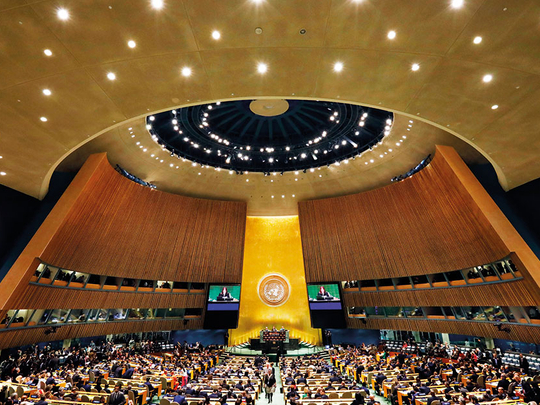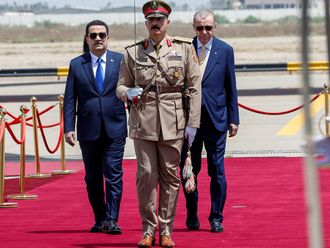
New York - President Donald Trump will address the full United Nations General Assembly on Tuesday and then host a UN Security Council session on Wednesday. Trump threw a wrench into the works on Friday by tweeting that the subject of the Security Council meeting would be Iran, after White House aides had insisted the agenda would broadly address proliferation of weapons of mass destruction.
That opens the prospect that Iranian President Hassan Rouhani may attend and confront the US president face-to-face. Trump may also find himself publicly isolated, as key US allies on the council including France and the UK have criticised his exit from the Iranian nuclear deal signed by his predecessor.
It may be a drama the president welcomes.
The Islamic Republic’s economy is struggling since Trump re-imposed US sanctions and threatened more unless the nuclear deal is renegotiated. The plunging rial and rising unemployment have shaken up a regime that analysts say is seriously concerned about its stability. Whether or not Europeans can strike a side deal with Iran to keep the nuclear accord alive, it is far from certain that Iran can lure investors bold enough to invest in an economy in free-fall.
“The bed is pretty much made the way it is. It’s fairly obvious the Iranians have little to go on and that Trump’s approach is working, with business people and banks walking away from Iran,” said Ray Takeyh, a senior fellow at the Council on Foreign Relations. “Diplomacy is important, but the battle has already been won in some way.”
Sanctions kicking in November 4 will go further, punishing countries - including European allies - whose companies continue to buy Iranian crude. The country’s oil exports have plunged about 35 per cent since April, more than expected, in anticipation.
Trump’s primary message for European leaders will be that the nuclear deal is a failure and European countries are leaving Iran after determining it makes more sense for them to maintain business ties with the US, according to a senior administration official who discussed Trump’s UN plans on the condition of anonymity.
But the official downplayed the idea that the US withdrawal from the Iran deal is eroding relationships with longtime allies. Trump plans to meet privately with both British Prime Minister Theresa May and French President Emmanuel Macron on the sidelines of the UN meeting, White House Press Secretary Sarah Sanders said.
In addition to Iran’s nuclear ambitions, Trump is likely to take on the country over forces and money it has poured into Syria, Yemen and Iraq. In his UNGA address last year, Trump called for “the entire world to join us in demanding that Iran’s government end its pursuit of death and destruction,” and may say something similar this year.
Trump has also said he’d be willing to meet Iranian leaders, and the UN gathering is a possible venue. But Supreme Leader Ayatollah Ali Khamenei, who has the final say on state affairs, has rejected talks “at any level” with the US, saying the Trump administration has proved that it cannot be trusted.
“The Iranians are hoping President Trump will be a mirage, a one-term US president,” said Alex Vatanka, a senior fellow at the Middle East Institute in Washington. “It’s a question of buying time until a new administration comes and takes a softer position. The sanctions are biting and the Iranians are buckling down.”











